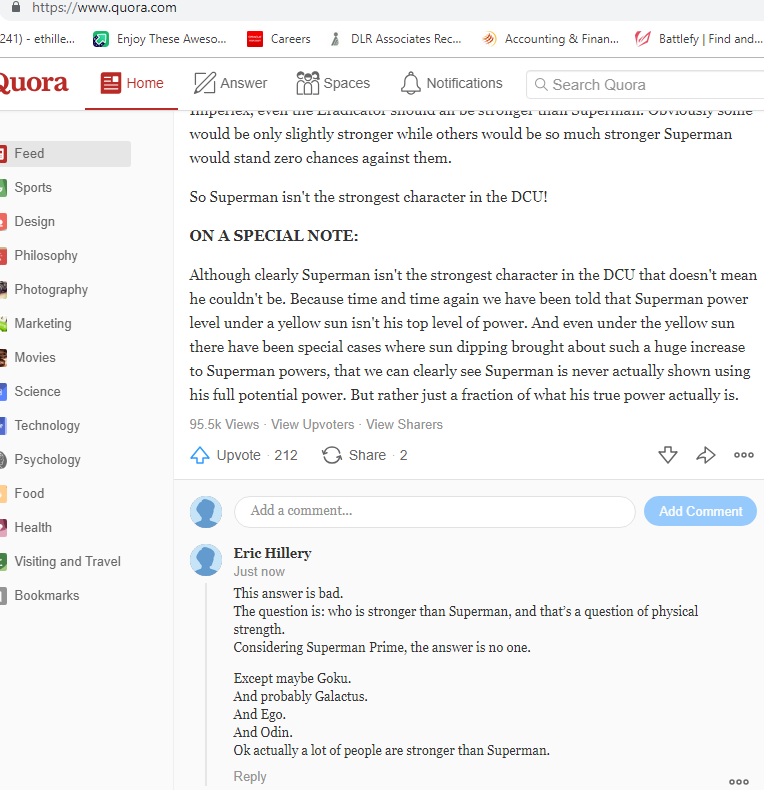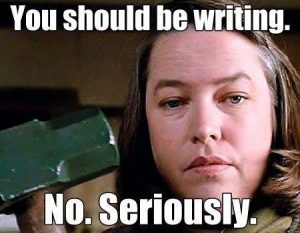I am right around the bend of my newest novel draft.
As in, I’m right towards the end.
I’ve learned a lot about pacing from my first attempt to get a book traditionally published. Even though I think, and know, in my gut how I feel about it (it’s an epic story) I know my first draft of my first full length novel had a lot of young-writer mistakes. (This is different compared to the trimmed down/macheted version that exists today.)
A lot of the descriptions, and ways, and focal points, and pacing were, to put ’em simply: n00b.
Hints: You do not need to carry on with your character’s commute, unless it’s really, really relevant to later. Subtle foreshadowing represents masterful writing, because it shows that the writer isn’t indulgent, but tightly paced and well-planned.
You don’t need to exposit the good and the bad of an MC. Just the importants.
We’re in an overly sexualized world, to the point that we’re desensitized. Talking about doodoo may actually be more effective than talking about hooking up, or incentives towards hooking up. (That’s not a literal tip that I practice, as much as a point.)
Keep it under 100. That is, keep it under 100k words. If you get a request when you’re querying for something that’s over 120,000 words, your premise is gold, and your query letter is too. But you’re writing better be more valuable than a diamond, cause (I think) 60k words is a tightly paced novel’s length. So do you really need to sell two books at once? Do, you, really?
So this, and more, is being carried into Bahamut, which I’ve decided to finish before my life probably gets more….typical. Bahamut is a story about a music composer who realizes that there’s a lot more to the industry than gigs, contracts, results and fanfare. It’s ambiguous in terms of what’s going on (there’re two strong possibilities, and you either have to blame the MC, or blame a really, really screwed up universe) and I’m not at the point where I should elaborate more than that but,
I’m at the fun* part where the ish hits the fan, and it’s everywhere. That part where if I’m doing my job well, I’m smacking the reader with “Behold! Thy nostrils are filled with the wafts of fan-poop!” and, it’s fun. It’s probably the most fun part of writing.
Well,
I read a writing post on reddit (as dorks will do) that was titled “Are you a gardener or are you an architect”. As you can probably guess from the headline itself, the idea is that architects tightly plan everything from blueprints, and freak out if things go out of whack from their original plans. They’re outliners. The other group, gardeners, just let stuff grow wild.
I’ve got two responses to that:
- Who the heck said gardeners just let stuff grow wild? Clearly, whoever wrote that isn’t a gardener. Gardening involves planning. You can have a blueprint for your garden. I get the idea, but, there had to be a better metaphor. Trailblazer, maybe, I feel like that gets the idea across. Let’s go with that.
- Almost every time someone gives me an “either/or” dichotomous paradigm, I wanna Zoidberg them with “why not both?”
I don’t write unless I know how it ends. I understands this baffles a great many writers who are incredibly successful. But this also invites what Stephen King says in On Writing, and in interviews what he calls as “The notebook” aka one of the worst things a writer can do. His argument seems to be that a notebook has no filter, so you fill it with good ideas, and bad ideas, and then that runs the danger of turning into a writer’s diarrhea.
(Oh dear, maybe I am taking my poop point too seriously.)
His argument is, that when you think about, and process, your mind will retain all the better ideas, and what results won’t be unfiltered, fettered garbage.
King, btw, is almost pure trailblazer in terms of his writing process. He’s one of the types who say they’re baffled when he hears a writer knows the ending, or even the last word of their work before they put their finger to a keyboard, or pen to paper, etc.
But why not both?
I had 2 outlines for Bahamut, and both have very, very similar major plot points. I could get into why, but what was going on in my life isn’t important.
What is important is, after Disjuncture, I saw the necessity and grew the balls to go off course. From my own outline. I wanted to tell myself that all of this ish is imaginary and, what’s going off course, from an imaginary course, anyway?
Well, I can still tell I’m coming around the bend. There are certain major plot points that I know to reach, and every day my head seems to be winding towards a new, less twisted, straighter course towards said point. And I put that down, and now, today, I know I’m about to reach that end. Plus, I’m enjoying the scenery. But I still have a mental map.
It’s just developed enough that I know that I can skip C. Or maybe combine B and D and make that C. But I’m still going to end up at J, even if it’s really L.
K?
I think the idea is, not to self-identify if your process is outline based, or trailblazed, as much as appreciate the virtues and weaknesses of both, and try and make the best of both styles. What works for King almost definitely won’t work nearly as well for another, but any writer almost certainly have a lot to learn from the guy.
He taught me to grow some balls enough to try and take shortcuts from my outline. Yes, sometimes shortcuts mean you might get lost, and may actually make things worse and longer, but they’re also fun, they’re more experimental, and I’d like to believe that those writers who know what they’re doing, rarely, if ever, get themselves lost in the sauce.


